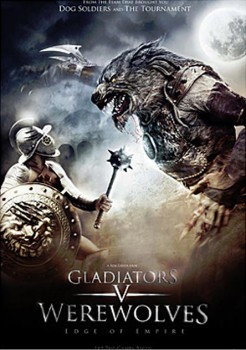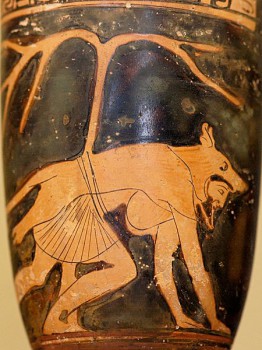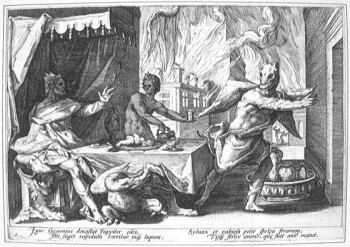Ancient Worlds: The Beast Within

Werewolves have gotten popular again.
I for one am glad to see it. Compared to their gloomy, night dwelling compatriots the vampires, werewolves are… well, they’re just more fun. Maybe it’s just me, but turning into an animal with great intelligence and heightened senses and running around howling to a full moon sounds immeasurably better than sleeping all day and drinking blood.
Ya know. If you had to pick. (I’m not the only one who plays this game, am I?)
In addition to being more fun, werewolves have the claim to being the older of the two Supernatural human hybrids, by at least two thousand years.
Herodotus (a Greek historian who wrote in the fifth century BC), for example, tells us that the Neuri, a people who lived in what is now the Ukraine, turned into wolves once a year for a few days.
Pliny (a Roman historian) tells a related story about a family in Arcadia who would take off their clothes, swim across a marsh, and come out the other side in wolf form. They would live as wolves for nine years, and if they managed not to kill any humans during that time they could reclaim their human form by reversing the process.

Petronius’s Satyricon also includes a werewolf story. Here, the freedman Niceros tells about the time he was travelling to visit his girlfriend and convinced a friend to come along with him:
He was a soldier, as brave as Orcus. We shifted our butts just before dawn. The moon was shining like the midday sun. We arrived among the tombs. My man went for a pee against a gravestone. I held back, singing and counting the stones. Then, when I looked back, he had taken his clothes off and laid them beside the road… he peed a circle around his clothes and suddenly became a wolf. Don’t think I’m joking. No one’s inheritance is so valuable as to make me lie. But as I’d begun to say, after he had become a wolf, he began to howl and ran into the woods…
(When I got to my girlfriend’s house…) Melissa expressed amazement that I’d walked there so late, and said, “If you’d come earlier, at least you could have helped us. For a wolf go into the estate and among the flocks. But even if he got away, the last laugh was ours, for our slave managed to get a spear through his neck.” WHen I heard this, I could not even think of sleep, but when it was fully light I ran off home… My soldier was lying in his bed like an ox, and a doctor was tending to his neck. I realized that he was a shape-shifter… (Satyricon 61-2, tr. David Ogden)
Petronius and Pliny both call their werewolves versipelles, literally “skin-turners.” The word “lycanthropy” was Greek and shows up in medical texts, but it refers to a physical ailment rather than any form of actual shape-shifting.
But if they’re just shape-shifters, why wolves? The ancient Mediterranean was still populated by any number of large predators and Greek myth is very willing to have people (especially women) (especially women who have slept with Zeus) turn into them.
The answer may be that while bears and lions did roam the countryside, they were primarily a threat to livestock and generally stayed well away from human settlements. Wolves, on the other hand, seem to fire up our imagination as potential predators in the way other animals just don’t. There’s no Little Red Riding Hood and the Bear, for example, even though bears are also native to Northern Europe.
Another clue to this may lie in the fact that one of the earliest accounts of a man turning into a wolf is that of Lykaon. (Yes, Teen Wolf actually got that one right.) Lykaon wanted to test the gods, so he served them a meal of his own son. They punished him, in at least one version of the story, by turning him into a wolf. In another legend, a man who ate a human sacrifice intended for Zeus also became a wolf.

So somewhere, in the back of our minds, wolves are still What Eats Us. The fear of cannibalism and the fear of the wolf somehow rolled together and produced the werewolf.
Why do we still love them so much? Maybe it’s that we adore being scared. Maybe we like the idea of being that powerful. Or maybe it’s that now, so far separated from the natural world, werewolves have come to symbolize a reunion with the wild rather than its threat.
After all, who doesn’t sometimes feel an urge to howl at the moon?
Some brisk discussion over at my Facebook page:
https://www.facebook.com/james.enge/posts/10202392710959478?comment_id=7430699&offset=0&total_comments=10¬if_t=share_comment
Ack!Doesn’t seem quite available yet, but it sure has a good writeup! http://www.avpictures.co.uk/gvw.htm
Interestingly, just reading an academic book covering this: “Ancient Germanic Warrior Styles”. It seems the whole wolf warrior thing goes back a long long way…